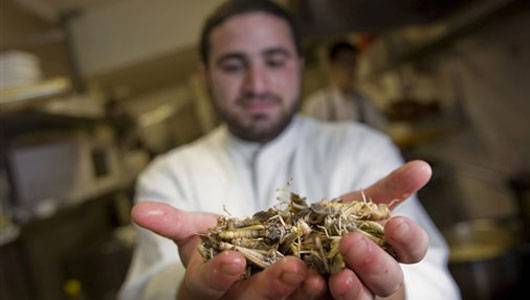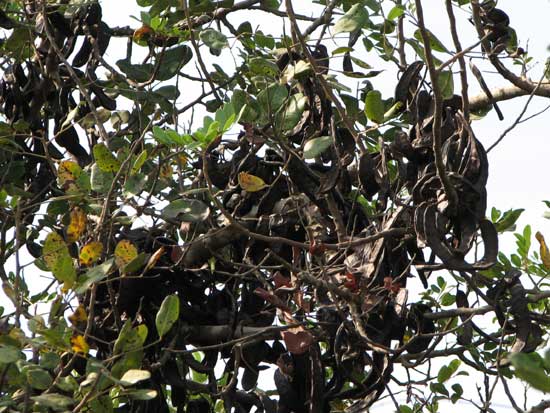- Jan 25, 2009
- 19,769
- 1,429
- Faith
- Oriental Orthodox
- Marital Status
- Private
- Politics
- US-Others
There was a conversation I was having not too long ago on my side of the street where people were discussing the subject of Entomophagy (the consumption of insects as food) and how it is something worldwide which has aided many.....and how it's often the case that certain animals people eat in the U.S are ones we're used to.....and do not get grossed out by. Yet with other cultures eating bugs, many get grossed out and even offended at people doing so....but never considered how they'd have no issue eating such if they grew up around it.
And as much as many have often discussed the need for Messianic congregations to be culturally sensitive with food when it comes to outreach amongst Jewish people, I've often been intrigued at how there are other Jewish groups culturally who would probably not fit in with many Messianic congregations since some of the food they may enjoy in their cultures (insects) would not be available.
The same goes for Gentiles who are encouraged to join the Messianic movement...and yet grew up in cultures where the consumption of insects took place. For others, if being told that eating insects falls within the category of "unclean" foods, it's perplexing since there were many insects listed within the ceremonial food laws that were available to eat....John the Baptist himself eating locusts as well as honey ( Matthew 3:3-5, Mark 1:5-7 ). ...and many others have noted the protein value that comes from certain insects.
As much as people may say they wish to adhere to a Kosher lifestyle and feel that advocating for the Biblical basis on such when presenting Christ/Jewish culture to non-believers, I do wonder how often there'd be a willingness to actually try many of the foods listed as edible within the Law if others asked for them in fellowship. For if doing outreach/missions to other places under the viewpoint that Gentiles would benefit from learning about what Kosher living was about, it would seem odd to preach on kosher animals that may make up only a small percentage of what food may be available....and for the insects they may live on, it'd be odd to see missionaries who feel they're kosher not be willing to eat those same bugs themselves.
That said, be it for those outside of Messianic congregations or within, I was curious as to what paticular insects foods you would be willing to eat in the fellowship if the opportunity came up. Additionally, for tose who may be Messianic and have a heart for the mission field, I was curious as to what would the kinds of insects you'd be comfortable consuming when in areas where that's all that's available.
Also, in regards to insects that were deemed unclean, I was curious as to what others thought of how it was that certain insects were a source of food for the Israelite people in differing ways...such as seen in how people could not eat bees due to their being unclean...and yet people ate honey (essentially chewed/regurgitated food passed around ) that came from bees.
The amount of times honey is referenced as a beautiful thing/positive in the scriptures is noteworthy (Genesis 43:10-12, Exodus 13:4-6 , Leviticus 2:10-12, Deuteronomy 8:7-9 , Deuteronomy 32:12, 1 Samuel 14:23-25 , 2 Samuel 17:28-29 /2 Samuel 17, 2 Chronicles 31:4-6, Psalm 19:9-11 , Psalm 119:102-104, Proverbs 25:16, Ezekiel 3:2-4 , Ezekiel 16:18-20 , Isaiah 7:15, Isaiah 7:22, Revelation 10:8-10, etc ). How could a product from an unclean animal be clean and yet the animal itself was forbidden to be eaten?
Again, Bees are unclean, and when ones extract honey from a hive dead bees as well as bee larva are in Honey until the honey is strained. How is it that Honey is clean? There was one instance that always stood out to me on the issue in regards to how Samson ate honey from the carcass of a dead lion ( Judges 14:7-9 ), eating the honey and giving some to his parents while not telling them where he got it, or that he killed a lion, for that matter. According to Numbers 6:3-6, Nazirites are not supposed to eat grapes or touch a corpse. Moreover, touching the carcass of an unclean animal makes an Israelite impure until the evening, meaning he must wash his clothes (Leviticus 11:27-28)...and thus, many have rightly noted where he sinned by defiling himself through eating honey that was defiled through its contact with a corpse (and of an unclean animal, no less)....
According to Leviticus 11:31-38, we read that an unclean swarming thing can defile stoves, clothing, water-jars, cisterns, and wet seeds. In this case, an unclean animal can pollute things, which can in turn defile the Israelites who use them. So maybe that applied to the lions honey. But even if Samson had perhaps chosen to find honey from a hive in a tree, part of me can see no real way outside of the fact that the honey product will still be coming from the mouth of an unclean animal...in the prescence of dead bee larve when one chooses to grab it.
Praying what I'm saying is making sense...for it does seem that some of the food laws as it pertains to bugs do not always seem to line up easily. Shalom

And as much as many have often discussed the need for Messianic congregations to be culturally sensitive with food when it comes to outreach amongst Jewish people, I've often been intrigued at how there are other Jewish groups culturally who would probably not fit in with many Messianic congregations since some of the food they may enjoy in their cultures (insects) would not be available.
The same goes for Gentiles who are encouraged to join the Messianic movement...and yet grew up in cultures where the consumption of insects took place. For others, if being told that eating insects falls within the category of "unclean" foods, it's perplexing since there were many insects listed within the ceremonial food laws that were available to eat....John the Baptist himself eating locusts as well as honey ( Matthew 3:3-5, Mark 1:5-7 ). ...and many others have noted the protein value that comes from certain insects.
Leviticus 11:21-22
All flying insects that walk on all fours are to be regarded as unclean by you. There are, however, some winged insects you may eat: those that have jointed legs for hopping on the ground. You may eat any kind of locust, katydid, cricket or grasshopper.
All flying insects that walk on all fours are to be regarded as unclean by you. There are, however, some winged insects you may eat: those that have jointed legs for hopping on the ground. You may eat any kind of locust, katydid, cricket or grasshopper.
That said, be it for those outside of Messianic congregations or within, I was curious as to what paticular insects foods you would be willing to eat in the fellowship if the opportunity came up. Additionally, for tose who may be Messianic and have a heart for the mission field, I was curious as to what would the kinds of insects you'd be comfortable consuming when in areas where that's all that's available.
Also, in regards to insects that were deemed unclean, I was curious as to what others thought of how it was that certain insects were a source of food for the Israelite people in differing ways...such as seen in how people could not eat bees due to their being unclean...and yet people ate honey (essentially chewed/regurgitated food passed around ) that came from bees.
The amount of times honey is referenced as a beautiful thing/positive in the scriptures is noteworthy (Genesis 43:10-12, Exodus 13:4-6 , Leviticus 2:10-12, Deuteronomy 8:7-9 , Deuteronomy 32:12, 1 Samuel 14:23-25 , 2 Samuel 17:28-29 /2 Samuel 17, 2 Chronicles 31:4-6, Psalm 19:9-11 , Psalm 119:102-104, Proverbs 25:16, Ezekiel 3:2-4 , Ezekiel 16:18-20 , Isaiah 7:15, Isaiah 7:22, Revelation 10:8-10, etc ). How could a product from an unclean animal be clean and yet the animal itself was forbidden to be eaten?
Leviticus 11: 33-35
Anyone who picks up their carcasses must wash his clothes, and he will be unclean till evening. They are unclean for you.
29 Of the animals that move about on the ground, these are unclean for you: the weasel, the rat, any kind of great lizard, 30 the gecko, the monitor lizard, the wall lizard, the skink and the chameleon. 31 Of all those that move along the ground, these are unclean for you. Whoever touches them when they are dead will be unclean till evening. 32 When one of them dies and falls on something, that article, whatever its use, will be unclean, whether it is made of wood, cloth, hide or sackcloth. Put it in water; it will be unclean till evening, and then it will be clean.
33 If one of them falls into a clay pot, everything in it will be unclean, and you must break the pot. 34 Any food you are allowed to eat that has come into contact with water from any such pot is unclean, and any liquid that is drunk from such a pot is unclean. 35 Anything that one of their carcasses falls on becomes unclean; an oven or cooking pot must be broken up. They are unclean, and you are to regard them as unclean.
Anyone who picks up their carcasses must wash his clothes, and he will be unclean till evening. They are unclean for you.
29 Of the animals that move about on the ground, these are unclean for you: the weasel, the rat, any kind of great lizard, 30 the gecko, the monitor lizard, the wall lizard, the skink and the chameleon. 31 Of all those that move along the ground, these are unclean for you. Whoever touches them when they are dead will be unclean till evening. 32 When one of them dies and falls on something, that article, whatever its use, will be unclean, whether it is made of wood, cloth, hide or sackcloth. Put it in water; it will be unclean till evening, and then it will be clean.
33 If one of them falls into a clay pot, everything in it will be unclean, and you must break the pot. 34 Any food you are allowed to eat that has come into contact with water from any such pot is unclean, and any liquid that is drunk from such a pot is unclean. 35 Anything that one of their carcasses falls on becomes unclean; an oven or cooking pot must be broken up. They are unclean, and you are to regard them as unclean.
According to Leviticus 11:31-38, we read that an unclean swarming thing can defile stoves, clothing, water-jars, cisterns, and wet seeds. In this case, an unclean animal can pollute things, which can in turn defile the Israelites who use them. So maybe that applied to the lions honey. But even if Samson had perhaps chosen to find honey from a hive in a tree, part of me can see no real way outside of the fact that the honey product will still be coming from the mouth of an unclean animal...in the prescence of dead bee larve when one chooses to grab it.
Praying what I'm saying is making sense...for it does seem that some of the food laws as it pertains to bugs do not always seem to line up easily. Shalom

Last edited:











